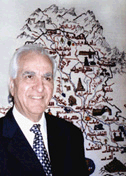The ''Academy of Islamic Tourism'' Project
With the publication of this issue, Islamic Tourism magazine celebrates its fifth anniversary. Its greatest achievement has been the publication of the magazine in Arabic and four other languages. Every two months we bring out an Arabic-English, Arabic-French, Arabic-Spanish and Arabic-German edition. Other international languages are being considered.
Our website, which is in perpetual evolution, mirrors the magazine and comprises of weekly news bulletins in five languages, covering major developments in the world of tourism. It also provides information about international exhibitions and allows the reader to review past issues of the magazine.
The magazine is now known in the five continents, mainly because of its participation in most international tourist exhibitions and the regular distribution of its news bulletin to tens of thousands of professionals in the tourism sector.
The first question that is posed by those who consult our magazine for the first time is: What is Islamic Tourism? The answers to this question depend on who asks and who answers. One such question was raised by the Arabic broadcast of the BBC, during a live transmission. I answered: “Nowadays, there are no limits to tourism and Islam”.
In the light of the above mentioned regarding the development of Islamic Tourism, I concluded that it is necessary to establish the scientific and academic basis of the rules and prospects for Islamic Tourism by making tourism the contemporary language of dialogue between nations. I thought that there is a need for the magazine to adopt the project of creating an Academy of Islamic Tourism. And I am pleased to present this project, which will be carried out in the holy city of Najaf, the capital of religious tourism in Iraq.
The questions which deserve to be raised here are as follows: What are the reasons for the creation of this academy? What materials will be used in the curriculum? What prospects are there for the graduates? etc. We will answer by saying that the purpose of the creation of this academy is the economic, cultural and scientific development, in accordance with Islamic values and their very rich heritage in terms of culture, sciences and archaeology, which can be summarised as follows:
1 - The concept of Islamic Tourism which is not limited to religious tourism, but extends to all forms of tourism except those that go against Islamic values.
2 - The rise of international tourism is closely related to economic advancement. After having seen the fruit of economic welfare, tourism became the engine of this wellbeing, to which all countries of the world aspire. Last century agriculture and industry attracted large investments. Today tourist projects require billions of dollars, as in the case of the Gulf states, which are carrying out giant projects and spending millions of dollars on tourism promotion and the attraction of foreign tourists. But this type of tourism is an imitation of what is already available elsewhere. It may not survive in the very competitive context of the international tourism market.
3 - The mausoleums and mosques of the prophets, the historical mosques and the places of pilgrimage are the raw material of tourism emanating from the beliefs of Muslims. There is no competition between these places, as each has a special significance for Muslims and thousands of Muslims visit the holy places every year. Investments in this type of tourism have a sure return, contrary to the other types of tourist ventures whose customers can be diverted towards other products.
How to develop this tourism and bring it up to date?
This tourism took a first step with the publication of Islamic Tourism magazine and a second with the addition of its website. The considerable range of these two media milestones encouraged the media and economic establishments to create specialized exhibitions and to build television stations to present TV programs about tourism sites and tourist cities. Many countries also adopted tourist development plans. This prompted us to set up the Academy of Islamic Tourism in the holy city of Najaf.
Why Najaf?
The answer is simple. In Najaf, we find the mausoleum of the commander of believers, Imam Ali Ben Abi Taleb, cousin of the Prophet, husband of his immaculate daughter and member of Ahl Al Bayt. The Koran praised their qualities and achievements and required that one greet them with each prayer made to the Prophet. A hadith (Prophet’s saying) tells us: “I am the city of science, and Ali is the gate”. Ali is the father of the Imams and the symbol of Islamic values. His mausoleum is visited by people from the four corners of the world; if the infrastructure was in place millions of Muslims would visit Najaf throughout the year.
Therefore, Najaf is a suitable place for the Academy of Islamic Tourism. It is located between three Holy Cities, Karbala, Najaf and Kufa with many mausoleums of Islamic saints and historical sites of early Islam.
Najaf was and remains an international centre of Islamic studies, language, theology, literature and history; so much so that it exceeded many international universities which are proud of their deep historical roots. During the last decades, modern academic studies started to take place in parallel with traditional studies which experienced a notable development until the present day. Eminent scholars of theology, poetry and literature graduated from Najaf and are now dispersed throughout the world.
The Academy’s Programme Of Study
The study programme must be comprehensive. It could include:
1 - The biography of the saints stressing their religious, scientific and human qualities. The historical facts should be collected and summarised by specialized scholars.
2 – The history of the construction of the mausoleums and sanctuaries of the world, their principal stages and the people or institutions responsible for their construction.
3 – The history of the foundation of Islamic cities and their development, in particular those which developed following the building of a mausoleum or sanctuary or for some other reason.
4 - Places of historical, natural and cultural interest in the Islamic cities and their surrounding.
5 - Occasions for visits to the holy places their duration and the accompanying rituals.
6 - Programming of tourism travels in order to market all kinds of tourism products. This should be taught in the final year because it requires more knowledge and experience. Software is available for these programs.
7 - Techniques for tourism guides, with full information devoted to the history of the sites.
8 – The hotel trade with all its disciplines.
9 - Social and cultural tourism.
10 - Restaurant management.
11 – All types of travel and local and international means of transport.
12 - Tourist information.
13 - Languages, mainly Arabic, English and the mother language.
14 – Ethics of tourism. (These could also be taught in the ordinary school curriculum).
15 – Other topics that could serve the development of tourism.
.
Opportunities offered by the Academy for those who want to continue their studies:
• The library of the Academy which will have books, magazines and bulletins relating to the material taught in the field of tourism and travel, and which will be accessible to students and researchers.
• The independent information department, internet facilities and photo library which will be on the premises.
• The permanent international exhibition which will be established in the neighbourhoods of the Academy to present various products and tourist activities.
• Work and training courses in hotels and restaurants (4 and 5 star).
• Contacts with schools, institutes and universities specialized in tourism, as well as the exchange of visits
• Co-operation with establishments and international organizations in the fields of culture and tourism, such as UNESCO, ISESC of the Organization of Islamic Conference (OIC), the Arab Travel Organization (ATO), and others.
• Visits to the sanctuaries, mausoleums, historic and tourist sites as well as activities which animate tourism in the neighbouring zones, such as travel agencies, restaurants and hotels, and practical training courses to compliment theoretical studies.
• Possibilities for organizing tourist trips to areas of Iraq and nearby countries to learn about their tourist sites and programs.
Where will the graduates be qualified to work?
- In all the trades of tourism and the activities which support it.
- As tourist guides accompanying tourists groups; even families and individuals.
- In tourism and travel agencies and developing tourist programs.
- In the administration of hotels, restaurants and other services specialized tourism aspects.
- In information and electronic programming as regards tourism and travel.
- As teachers of tourism in schools and institutes.
- In specialities and new activities of the regional and international tourist industry.
- In the preparation of exhibitions and taking part in international exhibitions to market tourist products.
These are a few ideas presented in this short introduction. There are other details that we may return to on other occasion.
May God guide us to success.
|

